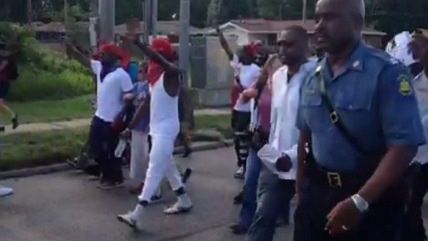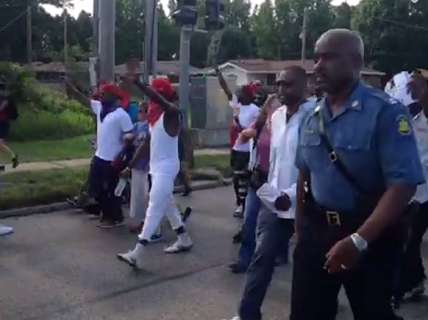Rejoice, For Last Night Cops in Ferguson Didn't Act Like Psychos


The big news out of the fifth night of protests in Ferguson, Missouri, over the police killing of unarmed 18-year-old Michael Brown on Saturday afternoon is that the police presence was a peaceful and decidedly non-militarized one, a stark contrast to the behavior and appearance of officers from various Ferguson and St. Louis area law enforcement agencies involved in policing protests on Wednesday night, when cops acted aggressively toward protesters and journalists alike, arresting at least 16 people. Ferguson cops, meanwhile, promised to release later today the name of the officer who killed Brown.
The change came after Democrat Gov. Jay Nixon ordered the State Highway Patrol to take over policing of protests in Ferguson. Photos from the fifth night showed cops dressed like cops, not soldiers. Observers on Twitter rejoiced that police stayed peaceful while monitoring last night's protest. It's a depressing illustration of how we've lowered expectations of police behavior. Ferguson police say they will release the name of the officer who killed Brown, a demand of protesters since Brown was shot. The prosecutor's investigation still has no projected end date, and there's not much reassurance available that the investigation won't end like so many others in this situation, with a decision that the use of force was justified.
Following some of the Ferguson commentary last night, largely expressing relief that police were remaining calm and weren't militarized, I couldn't help to think of the Lowered Expectations bit from Mad TV. The story of the killing of Michael Brown by police in Ferguson remains that an unarmed 18-year-old was killed to end an interaction that started over him and a friend walking in the street. In the national news cycle it may have become a story about riots, and then militarized police, and now about how a calm police force can relieve some tension in the community. The questions surrounding the death of Michael Brown, however, and the judicial process through which his killer will go through, and the protections his job will offer him, as well as the continuing trend of militarization of police across America and whether the plethora of bad actors among the law enforcement agencies swarming Ferguson until Wednesday night will face any kind of disciplinary action, are the real issues.
Editor's Note: As of February 29, 2024, commenting privileges on reason.com posts are limited to Reason Plus subscribers. Past commenters are grandfathered in for a temporary period. Subscribe here to preserve your ability to comment. Your Reason Plus subscription also gives you an ad-free version of reason.com, along with full access to the digital edition and archives of Reason magazine. We request that comments be civil and on-topic. We do not moderate or assume any responsibility for comments, which are owned by the readers who post them. Comments do not represent the views of reason.com or Reason Foundation. We reserve the right to delete any comment and ban commenters for any reason at any time. Comments may only be edited within 5 minutes of posting. Report abuses.
Please to post comments


And that's why, anytime someone starts with "there oughtta be a law!" you should ask them if the offense merits the death penalty. Because they can all end up there.
It's depressing how everytime I tell somebody that when they say that they're advocating violence, they look at me like I just grew a 3rd eye. Then the sputtering rationalizations begin.
But, but, but cops have a right to defend themselves! I mean, they only use violence in response to violence! They never start it! They're just doing their job! If people do what they are told then there will not be any violence!
P.J. O'Rourke rule: Would you kill your gray-haired mother for (law X)?
"Each and every time someone says 'there ought to be a law' they are saying that men with guns should enforce their will on innocent others." ~ Michael Barnett
It isn't that they *can* all end up there. . . it's that they *will* all end up there, eventually.
I'm amused by all the people who are wondering what's changed, as if the police department actively engaging the public with openness and honesty was some mysterious variable.
Oh, and don't read the comments if you value your health.
The change came after Democrat Gov. Jay Nixon ordered the State Highway Patrol to take over policing of protests in Ferguson.
From what I've read, it wasn't the Highway Patrol in general but the choice of native son Captain Ronald S. Johnson that made the difference. At first it looked like they choice a black officer to be the face of the change, but after what he's accomplished I'd say they picked him on merit.
*At first it looked like they choice a black officer to be the face of the change, but after what he's accomplished I'd say they picked him on merit.*
I'm sorry...didn't some people march up and down and all over 50 years ago AGAINST segregation?
So maybe it was a police riot after all (not that we didn't already suspect that). The looters are assholes who deserve to be punished, but they seem to be more of a symptom than a cause of a bad situation.
There appears to be a bit more about the Brown incident itself, though, than just "teenager walking down the street" - apparently Brown did in fact commit a robbery shortly before the shooting, roughing up a convenience store clerk in the process. Doesn't mean the shooting was necessarily justified, and it certainly doesn't mean that the Ferguson PD wasn't out of control. Just saying that reserving judgment about the Brown shooting itself might be prudent.
http://talkingpointsmemo.com/l.....e-shooting
Doesn't this kind of disprove the notion that local cops are better at policing?
Gee, that's nice. Did the townspeople also stop acting like feral animals?
In each such incident, it is an awful mistake to jump to conclusions.
I hated the way the media jumped into painting a "trailer trash" image of Caley Anthony. Even defense attorneys generally more suspect joined the mob in condemning Zimmerman.
I'm from St. Louis. The only major city that didn't have a major ghetto riot in the 1960s. I was one of about 2 whites in a work-study program helping dozens of students at Washington U in St. Louis, and one of the blacks moved with his family: "I didn't know there were so many white poor".